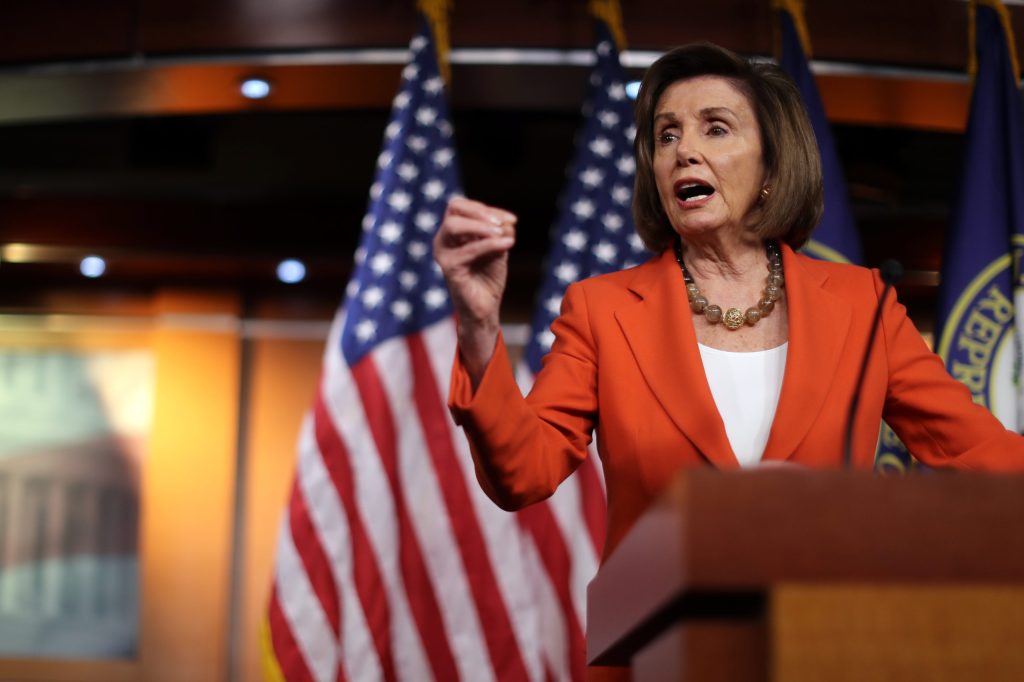Democrats are eager for the 2020 election to be defined by something other than the issues.
The impeachment of Bill Clinton in 1998 is well remembered as a partisan fiasco. Yet the attempted impeachment of President Trump is off to an even more partisan beginning: Republicans in 1998 succeeded in winning over many House Democrats to support an impeachment proceeding. In yesterday’s House vote, Democrats did not convince even a single Republican of the merits of the impeachment inquiry — and two members of Nancy Pelosi’s own party voted against it. Yet Pelosi and Adam Schiff are determined, and with the Democrats holding more than a two-seat majority in the House, they succeeded in pushing the inquiry through.
Such a weak performance in the House — on a vote that Democrats held only to defuse Republican criticisms about the lack of a formal vote in the full chamber — portends the nigh certain failure of impeachment should it get as far as a trial in the Republican-controlled Senate. Two Democrats there, as well, can’t be taken for granted as certain votes for seeing impeachment through. West Virginia’s Joe Manchin and Alabama’s Doug Jones represent states that have remained strongly pro-Trump since his victory in 2016, and Jones is up for re-election in 2020. Arizona’s Kyrsten Sinema is also enough of a genuine maverick to make her fellow Democrats worry. On the Republican side, figures like Mitt Romney, Susan Collins, and Ben Sasse are not much different from the likes of Trump-critical House Republicans who nonetheless voted against the inquiry push yesterday. And Trump’s conviction and removal will take more than just three or four dissident Senate Republicans — it would take no fewer than 20, and that’s assuming every Democrat votes to convict.
The Democrats driving impeachment matters think they have nothing to lose. Removing Trump isn’t necessary: if impeachment does him any damage at all in next year’s election, that may be enough to defeat him in a close race. Even better, vulnerable Republican senators in places like Colorado and Maine might be toppled by their impeachment votes — no matter how they come down on the ultimate question. A vote not to convict and remove might hurt them with independents; a vote for conviction and removal would cripple their chances of turning out their own party’s maximum number of supporters. Either way, impeachment brings Democrats closer to control of the Senate.
Impeachment has a further partisan benefit for Democrats: it distracts from the weakness of their presidential candidates. It’s obvious that the Democrats aren’t speaking to the middle ground of American politics. What is an average voter to make of a party whose big ideas, as represented by the presidential field, are prolonged deployment in Syria, a Medicare for All plan that depends on fantasy accounting, door-to-door gun confiscations, and tax penalties for churches that don’t accept the sacraments of gay marriage and transgenderism? And Joe Biden is not as far out on a few of these questions as his rivals are, he’s up to his hair plugs in other embarrassments, from his vote for the Iraq War to his association with the Obama administration’s immigration policies — too weak for the right, too harsh for the left. You can see why electability-minded Democrats are eager for the 2020 election to be defined by something other than the issues.
And if by some fluke the impeachment effort should succeed? Do Democrats really want an inoffensive conventional Republican like Mike Pence at the top of the GOP ticket in 2020? Are they supremely confident that the American public would go for having three presidents within 12 months — which is what we would get if Trump is removed, Pence takes office, and a Democrat defeats Pence?
Normally Pence would have little chance of firing up Trump’s base, but striking back for a successful impeachment would motivate and unify Republicans like nothing else could. It’s the one thing that would unify Trump voters and NeverTrumpers. Democrats can’t afford to be the dog that catches the car here, and many of them know it, they just can’t afford to say it.
Yet Pence and NeverTrump, Inc., should be careful what they wish for, too. Progressives and NeverTrumpers like to recall Barry Goldwater’s confrontation with Richard Nixon over that president’s impending impeachment, where Nixon heeded the voice of the conservative movement (and also the leaders of the GOP in the House and Senate, who also met with him) and resigned, leaving conservatives and the GOP free to get back to normal and go on without him. Only that’s not what happened: on the contrary, the GOP took a hard right turn after Nixon’s downfall, redoubling the appeal to the Silent Majority with a vigorous new populism. The results were everything from the antitax movement galvanized by Proposition 13 in California to the organization of the Moral Majority.
The moderate and liberal dimensions of Nixon’s Republicanism were the ones that fell by the wayside, and a decade after Goldwater called on Nixon to step down, it was Goldwater himself who was out of step with the Republican party on questions like abortion and gay rights. And far from the pre-Nixon conservatism of William F. Buckley Jr. and National Review defining the right once more, after Nixon’s departure the populist new right had leaders who considered Buckley an out-of-touch elitist — ‘Squire Willy’, in the words of Kevin Phillips, the Steve Bannon of that earlier populist wave. Pat Buchanan, not another Goldwater, was the long-term result of the conservative movement’s showdown with Nixon. And there’s reason to think the pattern will play out again if movement conservatism or NeverTrumpism plays a role in President Trump’s premature departure from office. The right will only be more energized, as well as newly unconstrained by Trump’s peculiarities.
So it may be a lucky thing for Trump’s partisan and factional enemies that he is unlikely to be removed from office by the Senate. They can try their luck at the ballot box, and the more cunning among them recognize impeachment as simply a means toward that end. Whether or not a partisan impeachment effort is enough to stop Trump’s re-election, it eases the Democratic party’s identity crisis and ratchets up the pressure on Senate Republicans in battleground states. (Though it also won’t help the Democrat Doug Jones in Alabama, too.)
As long as they don’t actually remove Trump, maybe Democrats can’t lose. They’re counting on him to survive — as weak as possible and dragging his party down. But voters didn’t reward Republicans in 1998 for their drive to impeach Clinton, and voters today may deliver an even bigger surprise in response to a significantly more partisan impeachment.



















